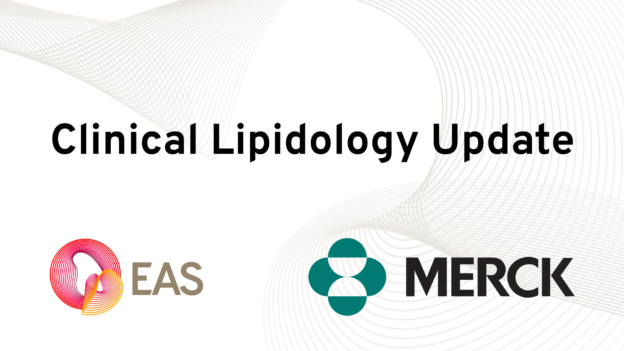A programme exclusively for invited members of the Merck team attending the face-to-face meeting 16-17 April, 2024
Welcome to the fascinating realm of lipid-lowering therapies, where theory meets the dynamic landscape of real-world patient care. This course is designed to bridge the gap between the theoretical foundations of lipid management and the experiences encountered in clinical practice.
Lipid-lowering therapies play a pivotal role in the prevention and management of cardiovascular diseases, a leading cause of global morbidity and mortality. Theoretical knowledge provides a solid framework, delving into the biochemistry, pharmacology, and guidelines governing lipid metabolism and its modulation. However, the translation of these principles into real-world scenarios involves navigating through patient-specific factors, healthcare systems, and evolving clinical evidence.
In this course, we will explore the intersection between theory and practice in lipid-lowering strategies. Through a comprehensive examination of the latest research, clinical guidelines, and case studies, participants will gain insights into the challenges and opportunities inherent in managing dyslipidemia. We will analyze how real-world factors such as patient adherence, comorbidities, and individual responses to therapy impact treatment outcomes.
We will navigate the complex landscape of lipid-lowering therapies, fostering a deeper understanding that takes in the guidelines, and decisions in the diverse and evolving world of clinical practice.
Welcome to a course that bridges the gap between theory and the rich tapestry of real-world experience in lipid-lowering therapies.
The Scientific Director of the programme is former President of the EAS, Prof Lale Tokgozoglu, Ankara, Turkey.
The programme is in two parts:
- Part 1: Available now. A short online curriculum comprising five on-demand lectures for invited participants to work through prior to…
- Part 2: A meeting 16-17 April, 2024. Separate registration is required, invited participants only.
Sign in required.
At your own pace, work through these presentations to refresh your knowledge in the area in advance of the face-to-face meeting.
Ask the panel
During the face-to-face meeting there will be lots of opportunity to ask questions to the course faculty. If while viewing the online presentations you think of questions that you’d like to put to the faculty, send them in advance using the .
Separate registration required, invited participants only.
Zurich, 16-17 April, 2024. A deep dive into lipid lowering in cardiovascular disease therapy.
The full programme is as follows:
| Day 1 | |
| 13:00 | Welcome, Introduction, housekeeping Lale Tokgozoglu, Turkey |
| 13:10 | Talk 1: Oral LDL-lowering therapies Luis Masana, Spain Presentation, followed by Speaker Q&A |
| Break 5 min | |
| 14:00 | Talk 2: Injectable LDL-lowering therapies Kausik Ray, UK Presentation, followed by Speaker Q&A |
| Break 15 min | |
| 15:00 | Talk 3: Evolving landscape & guidelines: importance of getting to goal Ulrich Laufs, Germany Presentation, followed by Speaker Q&A |
| Break 5 min | |
| 15:50 | Talk 4: Lp(a) – why is it important and how to handle? Florian Kronenberg, Austria Presentation, followed by Speaker Q&A |
| Break 15 min | |
| 16:50 | Talk 5: Residual risk by TGRL and inflammation-should we treat and how? Alberto Zambon, Italy Presentation, followed by Speaker Q&A |
| Break 5 min | |
| 17:40 | Panel Q&A |
| 18:20 | Wrap up Jeanine Roeters van Lennep, The Netherlands |
| 18:30 | Close |
| Day 2 | |
| 08:00 | Welcome, Introduction, housekeeping Lale Tokgozoglu, Turkey |
| 08:05 | Talk 1 : What is happening in real life in lipid lowering: access issues, underutilisation of PCSK9, public health issues, combination therapy, what do modelling studies promise? Kausik Ray, UK Presentation, followed by Speaker Q&A |
| 08:50 | Talk 2: Nonadherence is the new CV risk factor: How to improve? Lale Tokgozoglu, Turkey Presentation, followed by Speaker Q&A |
| 09:35 | Talk 3: Ongoing studies that may impact Guidelines and future therapies Ulrich Laufs, Germany Presentation, followed by Speaker Q&A |
| Break 15 min | |
| 10:35 | Case studies: Treating the right patient at the right time: Jeanine Roeters van Lennep, The Netherlands |
| Case 1: Luis Masana, Spain | |
| Case 2: Lale Tokgozoglu, Turkey | |
| Case 3: Ulrich Laufs, Germany | |
| Case 4: Jeanine Roeters van Lennep, The Netherlands | |
| 12:20 | Panel Q&A |
| 12:50 | Wrap up & Close Jeanine Roeters van Lennep, The Netherlands |
Course Learning Objectives:
- Understand the Evolving Landscape: Participants will gain insight into the current state of lipid management, including emerging guidelines and the evolving landscape of cardiovascular disease prevention.
- Importance of Goal Attainment: Explore the significance of achieving lipid management goals in cardiovascular disease prevention, considering the impact on patient outcomes and overall public health.
- Oral LDL Lowering Therapies: Examine the various oral therapies available for lowering LDL cholesterol, understanding their mechanisms of action, and evaluating their effectiveness in real-world scenarios.
- Injectable LDL Lowering Therapies: Analyze the role of injectable therapies in achieving optimal LDL reduction, considering their place in clinical practice and potential advantages over oral options.
- Lp(a) Significance and Management: Explore the importance of Lipoprotein(a) in cardiovascular risk, and understand strategies for its effective management in patient care.
- Residual Risk and Inflammation: Investigate the role of triglyceride-rich lipoproteins and inflammation in residual cardiovascular risk, and discuss approaches to their management.
- Real-Life Challenges in Lipid Lowering: Recognize and address access issues, underutilization of PCSK9 inhibitors, public health concerns, and the promise of combination therapies through real-life case discussions.
- Nonadherence as a CV Risk Factor: Understand the impact of nonadherence to lipid-lowering therapies on cardiovascular risk and explore strategies to enhance patient adherence in clinical practice.
- Ongoing Studies and Future Therapies: Review ongoing studies that may influence guidelines and future therapeutic approaches in lipid management.
- Case Studies – Applying Knowledge in Practice: though discussion of patient case-study examples
- Panel Q&A: Engage in a comprehensive discussion with a panel of experts, addressing questions from the audience and providing valuable insights on the day’s topics.
- Course Wrap-up and Closing: Summarize key takeaways, reinforce important concepts, and encourage participants to apply the knowledge gained in their clinical practice.
Course Content
About Instructor


